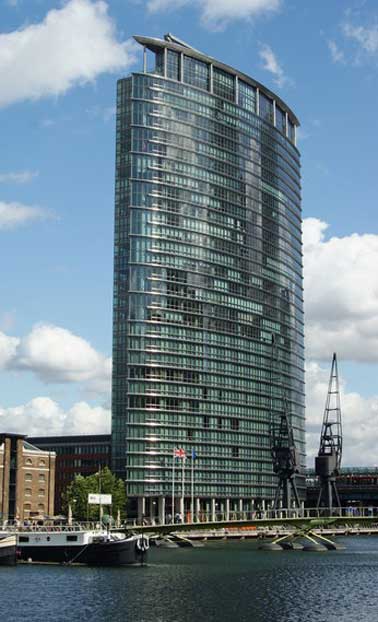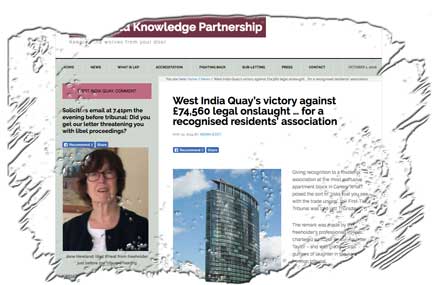
Giving recognition to a residents’ association at the most exclusive apartment block in Canary Wharf posed the sort of “risks that you see with the trade unions”, the First-Tier Tribunal was told last Thursday.
The remark was made by the freeholder’s professional witness, chartered surveyor Bruce Maunder Taylor – and was greeted with guffaws of laughter in the packed London tribunal.
Mr Maunder Taylor made the observation as the leaseholders at West India Quay – which featured in the film Layer Cake – sought official recognition of their residents’ association.
But the flats at the top account for only 53 per cent of the building, and the rest is occupied by a Marriott Hotel. It would be unfairly disenfranchised, according to Mr Maunder Taylor.
The trade unions remark was the unintentional comic high point of a four-hour hearing.
Recognition of a residents’ association is normally uncontroversial as it has few formal powers.
At West India Quay, there is no prospect of right to manage or enfranchisement owing to the 47 per cent commercial element.
A residents’ association has existed since 2006, and now includes 131 of the 158 residential leaseholds on the site.
But it is not recognised by the freeholder. A recognised residents’ association (RTA) can appoint a chartered surveyor / auditor to examine the accounts of the management of the building and so obtain information which – arguably – the leaseholders should be entitled to in any case.
The accounts at West India Quay were last presented in June 2010, the tribunal was informed.

In the case, the residents were represented by Martin Boyd, co-director of the Leasehold Knowledge Partnership.
Against them, the freeholder deployed a heavy brigade including Edwin Johnson, QC, of Maitland Chambers; his assistant; Steven Hughes, partner at City solicitors Lorrells; Richard Paul, of block manager Marathon Estates, and Mr Maunder Taylor.
All were employed by the freeholder the Yianis group, which was named in Parliament last December. The group is owned by Cyprus-born and Monaco-based John Christodoulou, who was not personally named.
Jim Fitzpatrick, Labour MP for Poplar and Limehouse, whose constituency includes some of the richest and poorest leaseholders in the country, said after the hearing:
“I have been appalled by the amount of time, money and effort the landlord has been willing to spend to oppose the formation of a recognised leaseholders’ group.
“I fully support the residents and plan to raise the landlord’s actions with the housing minister in the strongest possible terms.”
The tribunal, chaired by chartered surveyor Aileen Hamilton-Farey, aided by Judge Tim Powell on the panel, was left in no doubt of the underlying ill-feeling at West India Quay.
The residents’ representative Jane Hewland, a distinguished TV producer and former controller of current affairs for London Weekend Television, told the tribunal that she had received a letter from solicitors representing the freeholder threatening libel proceedings immediately before the hearing. (see panel left)
The tribunal was also informed that, in spite of the manpower employed by the freeholder’s legal team, the 233-page joint bundle of documents concerning the case was only made available to Mr Boyd and the leaseholders two days before the hearing.
The two panel members noted this point, but proceeded with hearing the case.

The tribunal first heard from Mr Paul, of the managing agent Marathon Estates. This company only manages West India Quay and nearby Canary Riverside, where the freeholder is also Yianis, the tribunal was told. Mr Paul informed the tribunal in writing that he is the owner of the company.
Mr Paul said that the presence of the hotel added to the site’s complexity. “If we did not have the hotel, it would be easier to manage,” he said, adding that the residents and the hotel had “sometimes complementary interests and sometimes competing interests”.
Mr Paul also indicated that the hotel “had more sway” in the management of the building and that if there were breakdowns in the plant machinery it would have to be dealt with more quickly than if it only affected the leaseholders.
Mr Paul was challenged on this by the tribunal chairman: “Is it [the hotel] more complicated; you just said ‘more sway of the hotel’.”
Mr Paul simply replied that the hotel was more complicated, and the question of whether management prioritised the hotel over the residents was not explored further.
Mr Maunder Taylor similarly stressed that West India Quay was a uniquely complicated mixed-use site and guidelines on recognition of a residents’ association should not apply in this case.
“I have not come across anything like it nor am I aware of a similar case to have come before the tribunal.
“Both the residents and the hotel have interests and they are not going to be contingent. Sooner or later there will be a conflict of their interests.”
Mr Maunder Taylor said that the hotel was a substantial payer of the service charges and should be represented.

Mr Boyd noted that recognised residents’ associations operate harmoniously in other sites with a high proportion of commercial property, such as Charter Quay in Kingston.
At West India Quay the freeholder ultimately controlled the commercial portion, but had chosen to rent it out to a hotel, and he should not be a party to the residents’ association.
Questioned by Mr Johnson, QC, Jane Hewland, the residents’ association secretary, told the tribunal that relations with the hotel were excellent and there was frequent dialogue between it and the residents. For example, over re-cycling issues.
There was a further moment of hilarity when Mr Johnson, QC, complained to the panel: “I cannot cross-examine Ms Hewland with Mr Boyd looking at me.”
This prompted open laughter and muttered comments of “Poor diddums”.
Ms Hewland said the residents, who have £100 million invested in the building, wanted to create a community at the site. The residents’ association had been instrumental in upgrading the fibre-optic cabling that had benefited the entire area.
Ms Hewland emphasised that the residents wanted to work with the freeholder and the hotel to ensure that West India Quay was a success.
Relations had been better with previous managing agents before the appointment of Marathon Estates.
Questioned by Judge Powell about risks of a worsening relationship with the hotel if a residents’ association were recognised, Ms Hewland: “That’s like saying nobody should get married because it might end in divorce.”
Judge Powell also asked her about communication with the freeholder, which she said was unsatisfactory: the residents had repeatedly asked about bills and the running of the building and had received no information.

“We constantly get the reply that ‘we will consult and revert’, but they do not revert.
“All we want to know is the costs of things that we pay for.”
Mr Johnson, QC, said that the application for recognition of a residents’ association was based on a misconception. One had existed since 2006.
“Jane Hewland says she needs recognition to get information but those rights exist anyway,” he said. “They have not used those rights.”
Again Judge Powell intervened, asking Mr Johnson, QC: “But what do you do if a landlord refuses to comply? There is no civil legal remedy to force a landlord to comply. It would have to be a criminal action.”
There followed a discussion on this aspect between Mr Powell and Mr Johnson, QC, with Ms Hamilton-Farey noting: “There is very little sanction if landlords do not comply with the law. Rights do exist but you can see that people do not exercise them.”
There was mention of only one occasion when the threat of criminal proceedings had been adopted to ensure a freeholder provided leaseholders with information.
Mr Johnson then got to the main concern of the freeholder: a recognised residents’ association would have the right to appoint a surveyor to inspect documents and these could be wider in scope than those concerned with the service charges.
The surveyor had “a very wide remit”, Mr Johnson, QC, said. “He could ask to see the commercially sensitive management agreement with the hotel, for example”.
Mr Johnson, QC, then gave three grounds to refuse recognition.
1/ “Granting recognition will be granting the upper [residential] half of the building powers over the lower [the hotel]. We do not think it is right that a representative of the upper half should be given rights to the whole of the building. That was not what was intended by the law.”
2/ “The tenants are only ever going to be able to reach 53 per cent. There is no point in having a recognised tenants association if it does not have the right to speak for the whole of the building.
“This building cannot ever represent the hotel.”
“The 60 per representation [the guideline for RTA recognition] cannot be achieved in this building.”
“The guidelines were not drawn up with West India Quay in mind.”
3/ Mr Johnson was very concerned by a single investor East Tower, which owned 42 flats. “Our concern is that East Tower is a commercial operation and that it can interfere with the operation of the Marriott.”
Mr Boyd concluded by saying that the law for a recognised tenants’ association was very straightforward.
“Recognition of an RTA would prevent the need for the leaseholders to take other costly forms of redress.”
“There have been no accounts since June 2010.”
“The landlord’s position is that the law should say something that it does not. He wishes you to reinterpret it to incorporate the commercial element of the site. He argues that if recognition were granted, the commercial element would be disenfranchised.
“But legally the only other persons involved in the site are the respondents [the freeholder]. The fact that they have a separate commercial contract with a third party sits outside anything that this act seeks to address.”
Mr Boyd pointed out that the freeholder owns 47 per cent of the building and enjoyed a “raft of rights”.
“But the residents seek an RTA which has only one main right: the right to appoint a surveyor to examine the accounts that impact on their part of the service charges.”
“The surveyor would only be looking at the lower part of the building [the hotel] in relation to charges paid by the leaseholders.
Mr Boyd concluded: “The powers of a recognised tenants’ association are limited and if those powers are abused it is in the tribunal’s power to remove that certificate.”
The tribunal will make a ruling in three-four weeks’ time.



























Wow. I am glad we didn’t choose Maunder Taylor for some work for which they were recommended to us–just as I wouldn’t use any law firm associated with Mr Justin Bates.
BMT has a very good reputation. We used his firm at Charter Quay so do not write them off for taking the landlord’s shilling.
The submissions in this case have been very helpful in providing information on changes to the guidance which, we argue, need updating. The issue was also considered by the British Property Federation last Wednesday. We met DCLG officials on Friday.
The issue of late provision of documents is something that must change.
Martin these are the tactics used against my friend Norman Greed when he took his case to the LVT.
Why do the LVT and now the FTT allow these thing to occur time after time which allows the Freeholder/Landlord a head start.
One would even say that the late provision as happened here is now the norm.
Do the Leaseholders have any answer to this disgraceful legal happenings?
I have to agree with Martin, as I too have had dealings with MT’s and found them to be very efficient and knowledgable. They gave me the information I needed whether I agreed with it or not and were most helpful.
I understand that most readers here are of one point of view, but it is the role of professionals to act as advisor and advocate for/to their client. It is fair to draw the line in those that they associate with, but a review of his role in LVT decisions etc show that he is both professional and objective. I can understand his logic on the trade union comments,it is similar to the “tail wagging the dog” and both can be true when the commercial element is substantial and parties at polar opposites. The important point is that this relationship soured when the manager changed leading to the need for an RTA.
In in these “hotel/condo” sites the approach of the on site management to both groups of residents,Having had to hunt down the bar staff more than once at WIQ, perhaps I have a dim view.
While I would suspect that a “libel letter”, though if it was spoken it should be slander, was a tactical step, people involved in such groups must be very careful about the comments and accusations that they make, nor matter how heartfelt or ultimately proven to be true.
When starting out in this process obtaining group liability insurance which includes legal expenses, from £50 upward, is almost essential; these days “loose lips” lead to legal bills even if your defence is successful and a landlord or agent is a proven robbing barsteward.
Well on the crimninal action I have secured one prosecution and one to the “step of the court” so there is more than one as mentioned which is good news for owners. I can relate several examples where the threat has achieved the production of paperwork., and several local authority prosecutions.
Under the new tribunal rules owners should argue that the late service of paperwork should lead to an adjournment and costs of the lost time to the tribunal The resistance to doing so is that unlike a court most hearings block a day(s) or half a day and there is nothing to take that slot “on the day” or at short notice. If the T issued a penalty or costs for that, it might help. Sadly its a legacy of the LVT approach of ” as or while we are here….”
This caused some discussion in the tribunal, with Judge Tim Powell being initially unaware of any prosecution instigated by leaseholders to obtain information from the freeholder.
This prompted some discussion with Edwin Johnson, QC, and a case at Frognall (north London?) was mentioned.
It was acknowledged to be extremely difficult to initiate criminal proceedings and it was very rare.
If you have examples, the case names or, better still, reference numbers would be useful.
(Your point about slander is very minor. The word libel was used in tribunal, but at this stage we do not know what form of defamation the freeholder is alleging.)
It was a long time ago so I’ll have to rack my brains a bit for the parties etc :). Indeed it is hard, however the last time advice was taken on this I seem to recall the concern that the application might be blocked or taken over by a public body. That too I will pull out.
It is however hopeful and perhaps LKP might talk to Bottomley and Fitzpatrick about a private members bill to provide a civil remedy for aspects of the 85 and 87 Act. We are told parliament has a light legislative agenda until May 2015..
I mentioned the slander as while it is a minor point I wondered if there was more to it than remarks as that would be inconsistent with a letter referring to libel. Nonetheless its an important reminder that passion should not exceed reason no matter how self evident a wrong doing might be. Legal bills alone can be considerable.
You may well wonder about the defamation issue involved here, but you must do so with caution and, ideally, elsewhere.
There is no suggestion that there was “passion” involved here, or indeed “wrong-doing”.
It is with sincere regret that reflecting on legal advice that I cannot add anything further. Discussing ANY material which identifies me or others could lead to online material that affects not simply myself (which I can take, smiling, on the chin) but others too, affecting their practice reputation and goodwill. It is personally and commercially untenable to leave an internet footprint associated with negative comments, in what is, I accept, a negative environment in respect of leasehold matters, and where readers may take them at face value, rather than their validity or use.
I understand that the objective response may be disappointment but many will form, and no doubt some will express, their own opinions in an “either with us or against us” or the trite “nothing to hide” mindset, without realising that it is that that leaves them worse off.